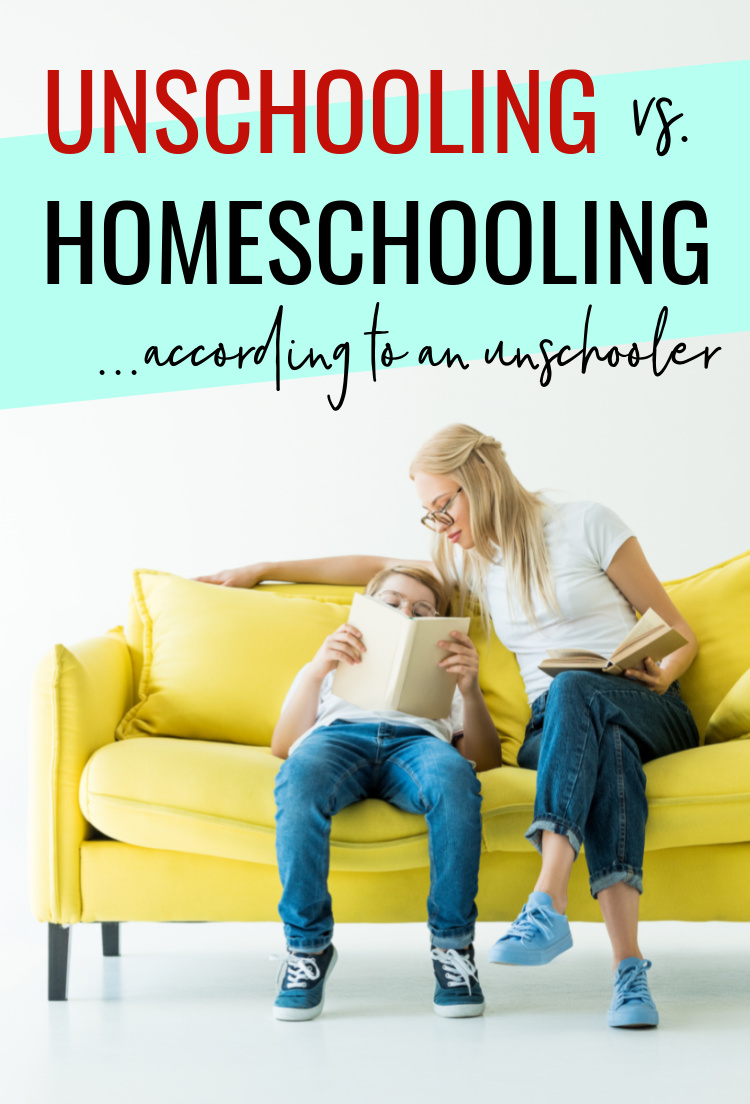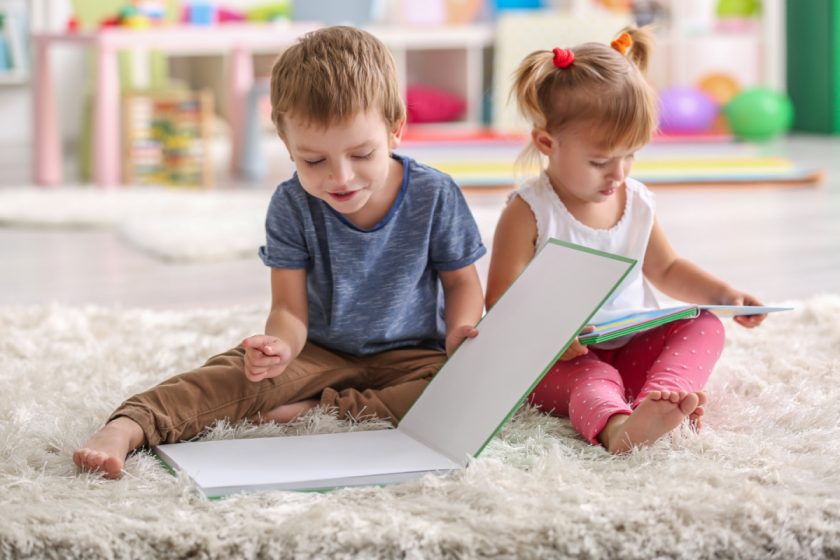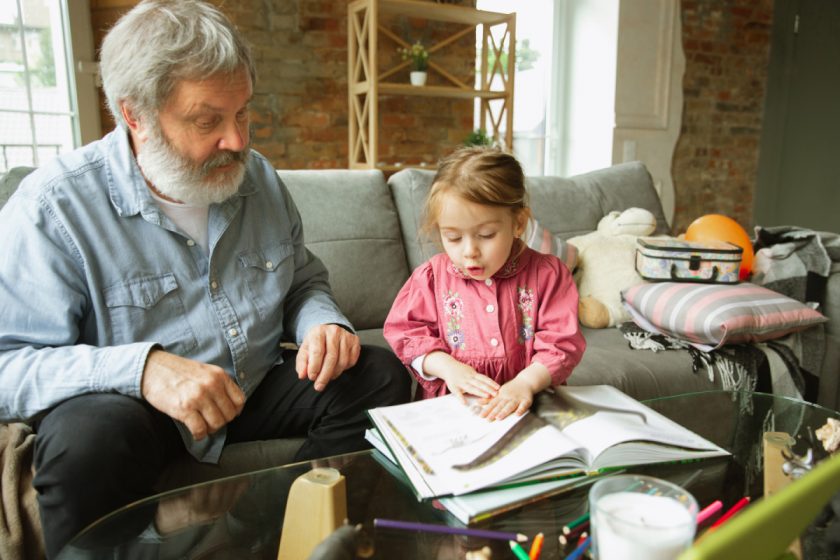Inside: Unschooling vs. Homeschooling. You’ve heard about unschooling, but is it really all that different from homeschooling? Learn the five core beliefs all unschoolers share, and how homeschooling parents tend to differ from their unschooling peers.
Once upon a time – seven years ago to be exact – I started homeschooling. I had three kids going on four at the time and absolutely no idea what I was doing.
But as soon as I started homeschooling, I realized pretty quickly that a traditional homeschool approach wasn’t going to work for us. Buh-bye boxed curriculum.
While I quickly rejected a school-at-home approach, I wasn’t quite ready to embrace unschooling, even though the idea intrigued me. At the time it was too radical, too alternative, too other.
Even vaguely bringing up the word to close friends or family was met with instant looks (or tones of voice) that said wordlessly, “Have you lost your ever-loving mind?” It was like I had two heads…and in their defense, unschooling is a pretty radical idea in our world today.
So I stopped using the term. I decided to go with a label that felt safer at the time – relaxed homeschooling – which is probably for the best because I wasn’t yet ready to embrace unschooling, all that it stands for, all that it means.
But seven years later, I’m finally ready.
Related: Relaxed Homeschooling Versus Unschooling – What’s the Difference?

Unschooling vs. Homeschooling: Core Beliefs Compared
This post probably contains affiliate links, which means I may earn a commission if you make a purchase through those links. As an Amazon Associate, I earn from qualifying purchases. You can find our full disclosure HERE.
Especially in the comparisons, keep in mind that I can’t speak for every homeschooler. Some might not use the label “unschooling”, but they might nod in agreement to everything on this list.
Like I was for a long time, some might feel reluctant to use the term unschooling because what society doesn’t understand, it often condemns. Homeschooling is misunderstood enough without adding another extreme word to the mix.
All that to say, take these premises with a grain of salt. This is what unschooling means to me after reading several unschooling books and blogs and homeschooling for the past seven years.
So what is the difference between homeschooling and unschooling?
Here are what I consider to be core unschooling beliefs…and where homeschoolers tend to differ.
Homeschooling vs. unschooling: on to the differences!
You Might Also Like: You Don’t Need to Turn Everything Into a Learning Experience

1. Unschoolers believe that learning is happening all the time, and that humans are naturally driven to learn.
This was pretty obvious to me from the beginning. Learning is happening all the time: it cannot be confined to four walls and seven specific hours a day.
Why does learning happen all the time? Because humans are innately motivated to learn. Much like when humans feel hunger, they will find food to satisfy that hunger, humans feel curiosity and are motivated to find answers to satisfy that curiosity.
Curiosity is part of what makes humans human.
Will we ever stop being hungry? No.
Will we ever stop being curious? Unless that natural urge is “broken” in some way, humans will never stop being curious; they will never stop learning or wanting to learn.
We also believe that knowing how to learn is far more important than what you learn. If children know how to learn AND retain their natural curiosity, they can learn just about anything for the rest of their lives.
Related: 8 Easy Ways to Unschool Science and Nurture Natural Curiosity
What do homeschoolers believe? I can’t speak for all homeschoolers, but I suspect that many would agree with this basic premise…to an extent. However, homeschoolers tend to see some learning as more valuable than other learning. Book learning, workbooks, formal learning is valued higher than say, learning how to beat a video game. In unschooling, all learning is equally valuable.

2. Unschoolers believe that forced and coerced learning destroys natural curiosity.
What happens when you force children to eat when they are not hungry? What happens when you make them eat foods they don’t enjoy when they are hungry? Or if you don’t believe them when they say they aren’t hungry (even if you know instinctively that they will be 15-20 minutes from now)?
You effectively “break” their body’s natural knowing of their own feeling of hunger. They don’t trust their natural instincts anymore – they might even decide to ignore them altogether.
You also create an unhealthy relationship between your child and food. When children have an unhealthy relationship with food, they are at increased risk for eating disorders later in life.
Children have amazing set points in their brains that alert them when they are hungry and full…It is important to children to feel hungry and full on their own so they learn to adjust to their natural physiological set points.
Center for Discovery: Eating Disorder Treatment
Unschoolers believe that, in the same way, forced and coerced learning (like what happens in school) “breaks” the body’s natural curiosity settings. You also create an unhealthy relationship between your child and learning.
You Might Also Like: Unconventional Parenting Advice You Don’t Need to Follow
What do homeschoolers believe? Many homeschool parents use some kind of curriculum, which dictates what the child needs to learn. They may leave room for children learning the material at their own pace, but many homeschoolers still hold to the basic premise, “My child must know certain things, and I, the adult, know what they need to learn.” Children may be given the freedom to wait, but not the freedom to opt out entirely.

3. Unschooling parents believe their primary role is to cultivate an environment and life that inspires learning, and to find resources that support their child’s interests.
Children learn an entire language in a loving, supportive environment. It’s not like parents sit around all day systematically teaching every single word of the 10,000 children know by age 5 (source).
No. They trust that with regular interaction – talking to their child, reading to them, modeling adult dialogue, taking them out of their homes to interact with other adults – their child will learn their native language.
The same is true of walking. Parents gently encourage, but do not force, walking. Why not? Because they know that ultimately (for most children), it is up to the child to be ready and motivated to learn how to walk.
So if a child can learn to walk and talk in a supportive, loving, and non-coercive, environment, why can’t their entire education happen in much the same way? At their unique pace and flavor, with a loving parent to support and guide them?
Unschooling parents believe their role is:
- modeling a rich life of learning themselves
- inviting their child to participate in real world activities
- strewing things/experiences that might spark new interests
- finding resources to satisfy their child’s unique curiosity
- creating a language-rich environment at home
Unschooling parents are constantly observing their children. What are they interested in? What might they enjoy? What is their learning style?
We also regularly check in with them: what do you want to learn more about? How can I help?
It’s a delicate dance of meeting your child’s needs, presenting new ideas, information, experiences that might be interesting to them. But on the flip side, never using coercion or force, and working hard to create an environment where kids truly feel free to say, “No thanks, mom/dad, I don’t want to learn that right now.”
What do homeschoolers believe? I see more homeschool parents creating environments that foster natural learning, making room for learning through child-led, free play, which is encouraging! In general, however, homeschool parents may tend to hold more tightly to traditional teacher/student roles, with the teacher holding most of the power and control.
Even when power and control is more equally shared, this would still not be considered unschooling. Unschoolers give their children complete control over their education: parents facilitate and curate resources to support their interests and passions. We may suggest, strew and invite, but only after complete freedom for the child to decline has been established.

4. Unschoolers believe that every child is unique – in their development, interests, and gifting. Therefore, every child deserves an individualized education.
We live in a world obsessed with developmental timelines. And anything outside of our box of what’s “normal” means you must have a disorder, or something’s wrong – with you or with your teacher or parent.
You’re either ahead, or you’re behind.
The problem with timelines around learning is that they are all established by observing schooled children. The only norms society accepts are based on what children are like in school.
We have no grid as a culture for what children are like outside of school.
So when an unschooling parent says their child didn’t learn to read until the age of 9, many people are horrified and quick to shout neglect from the rooftops (or in a Facebook comment).
What they don’t understand is that if you are in school, you need to read, or you don’t progress. Reading is the easiest way for teachers disseminate information to 25 students at a time.
When you aren’t in school, you can learn in ways that don’t require reading – like through video or a parent relaying information.
If you are given the freedom to learn to read when your brain is ready and you have a good reason to do so (which unschoolers trust that eventually, you will have a good reason), you learn to read.
That same logic applies to all other forms of learning.
A child who adores all things history and goes on to have some kind of career related to history may never need upper level math beyond, perhaps, statistics.
Another child may love math and go on to complete Calculus 3 and beyond, but never needs to take writing courses beyond what she needs to write papers detailing her research.
Not all children will need what schools consider essential…at least not at 16, 17, 18. To unschoolers, a good education is an individualized education, which means it will be unique and not uniform.
And if you do believe they truly “need” it and think compulsory education is the way to get the job done, how much do you really think they will retain after being forced to learn it? How much do you remember from subjects you hated in high school?
Related: Learning to Read Is a Natural Process…If You Are Willing to Be Patient
What do homeschoolers believe? I’ve found that many homeschoolers agree with this statement to some degree, but often not to the extent that unschoolers do, especially as children approach high school. They may not feel comfortable allowing their child to opt out of that formal geometry course or wait to learn to write an essay until they truly need that skill.

5. Unschoolers believe that children can be trusted to learn what they need to know, when they need to know it. They trust that if it’s truly necessary, a child will eventually be motivated to learn it.
This is where I got stuck for so long. I wasn’t 100% convinced that my kids could be trusted with their own learning.
That’s why my definition of relaxed homeschooling left the parent ultimately in charge of education. I couldn’t quite swallow letting go of control. I was too afraid.
But over the past couple of years, the more I have slowly released control, I more I see that yes, my children can be trusted. And moreover, the process can be trusted.
When I get stuck in the day to day – or even year to year – view, it’s easy to want to take the reins back, to seize control again because of fear.
Fear makes me want to say, “You need to learn this RIGHT NOW because I think you need it, and I’m afraid you’ll never learn it, and if you don’t learn it, you’ll never succeed in life, and…” Worst-case scenarios aren’t pretty.
Fear rarely leads to rational decisions or choices or beliefs. Unschooling constantly pushes parents to question their own fears, to get to the root of the beliefs underneath those fears (otherwise known as “deschooling”). Most of the time, they are unfounded.
Unschooling compels us to ask, “Why?” My thought process usually looks something like this…
Why do I think this one piece of information – or this one skill – is so crucial? Is it really? And if it really is so crucial, what leads me to believe that my very capable child won’t at some point come to the same conclusion, and choose to learn it? Why don’t I trust that in time – at some point in eighteen years – my child will want to learn this very crucial thing?”
The heart of unschooling is that children can be trusted. And anything that causes us NOT to trust them is usually our (the parents’) problem, not theirs.
Related: What Is Respectful Parenting? A Refreshingly Radical Philosophy
What do homeschoolers believe? For a variety of reasons, homeschoolers rarely give their children the same level of trust and freedom that unschoolers do. Even the most relaxed homeschooler (as I used to be) usually holds onto the belief, deep down, that they will eventually need to make their child learn something they don’t want to learn…because that thing is essential to being a successful adult.

Is Unschooling Easier Than “Regular” Homeschooling?
Contrary to popular opinion, unschooling can be a lot harder than homeschooling. Sometimes, I long for a boxed curriculum with easy boxes to check.
Finding resources that match your child’s interests in a world full of curriculum and “age-appropriate resources” is so very far from easy. We live in a world where adults don’t expect children to deep dive into very specific interests, so there isn’t always a child-friendly course or an easy avenue for them to learn more.
Apprenticeship is not natural today. Unschooling parents work hard to find opportunities for their children to learn what they want to learn, when they want to learn it. And even then, it’s not always possible to pursue their interests fully in today’s world.
One example: my daughter desperately wanted to volunteer at the library to shelve books for two years straight. But child labor laws – and the general limiting beliefs around what children are capable of – prevented her from being able to do so.
She played pretend librarian over and over with our own small book collection, but it wasn’t enough. Sadly (or not sadly? who knows), the pandemic made it even more unlikely for her to volunteer, and her interest died before we were able to find a librarian who was willing to work with her.
On the other hand, following your child’s interests and passions can be an easier path in some ways. You’re no longer fighting for control, forcing them to do this or learn that, and taking control out of the equation can make a huge difference in your homeschool and in your relationship with your child.
You Might Also Like: The Top 12 Unschooling Books for Rethinking Education

What If I’m Interested In Unschooling, But Not Quite There Yet?
It’s more than o.k. to be on a journey towards unschooling. That’s where I’ve been for seven years now!
Ultimately, what marks an unschooling parent more than anything else is questioning everything, especially why we do what we do as parents.
Read unschooling books, listen to unschooling podcasts, follow unschooling social media accounts, sign up for my e-mail list. Ask questions: be curious.
If you’re willing to ask questions about everything and examine the “why” behind everything you do as a parent and a home educator, there’s room for you here.
Are you an unschooler? Did I miss anything explaining the differences between unschooling vs. homeschooling? Share in the comments!
Read Next: How Much Does Unschooling Cost? Typical Expenses & How to Save


What does the State require an unschooler family to report? Are unschooler families able to participate in sporting events ( mostly are from public school supported). Do you live in a state that doesn’t require reporting your children’s educational information? What if a family lives in a state that has set up “home educational” mandates that a family MUST MEET to even be able to keep their children out of the public school system? It is a shame but the government will claim neglect and take your children unless you follow THEIR educational mandates! How can a unschooling family get past these mandates. Must they move to a state that does not require these mandates; which may be impossible for a family. Unschooling sounds Great, but the USA government presses hard to make this ideal education IMPOSSIBLE!
We’ve lived in a few different states, and it’s actually not that difficult to unschool. The only states I would find it challenging would be the ones that require you to report hours by subject. That would be super annoying!